In this blog post, we’re crossposting the work of one of our grantee organizations and top charities: New Incentives, which gives cash incentives for parents and caregivers in Northern Nigeria to take advantage of standard childhood vaccines that are freely available from government clinics. Recently, New Incentives wrote about the experiences of their staff member Idris and a mobile vaccination team on one particular Saturday morning in Kano State, Nigeria.
While most of the vaccinations that New Incentives incentivizes occur at stationary clinics, mobile vaccination teams exist to serve mothers such as Alawiyya, aged 20, who says she lost so much blood during the recent home birth of her child, now three weeks old, that she wasn’t able to walk the few miles to the nearest clinic so baby Aliyu could be vaccinated.
At GiveWell, we direct funds based on careful, rigorous examination of quantitative evidence from academic trials and other on-the-ground research. We worry that simple stories can be misleading, often because they cherry-pick the best-case outcome of a program while obscuring its general impact. They can also result in charitable funding being directed toward more photogenic causes, even when the need might be greater elsewhere.
Nonetheless, we hear from some of our donors that stories and photos help bring the impact of their donations to life, and we think that this vivid example of New Incentives’ work is a great way to experience that. We also think that understanding the logistical details of how programs are implemented, and the varied and specific challenges they face, helps make clear why GiveWell’s detail-oriented, evidence-centric approach is so important.
For example, on this particular day, this mobile vaccination team was able to vaccinate more babies than expected in Alawiyya’s village, Jijiyawa, but only one baby out of the expected five in another village, Yan Gizo. Carefully tracking how many of the eligible babies ultimately get vaccinated is crucial for figuring out how cost-effective the program is.
So we wanted to share the stories of Idris, Alawiyya, and this particular mobile vaccination team on this particular Saturday morning, even while flagging that it’s just one of the 5,900 clinics and 11,130 mobile vaccination sessions that New Incentives staff participated in during January 2024. The plural of “story” is not data, but the stories do combine into a whole lot of impact for babies and their families.
You can read the original post on New Incentives’ website, and sign up for New Incentives’ email newsletter here.
***
Helping to Vaccinate Hard-To-Reach Children: A Day with a Mobile Vaccination Team
New Incentives Communications Team, March 11, 2024
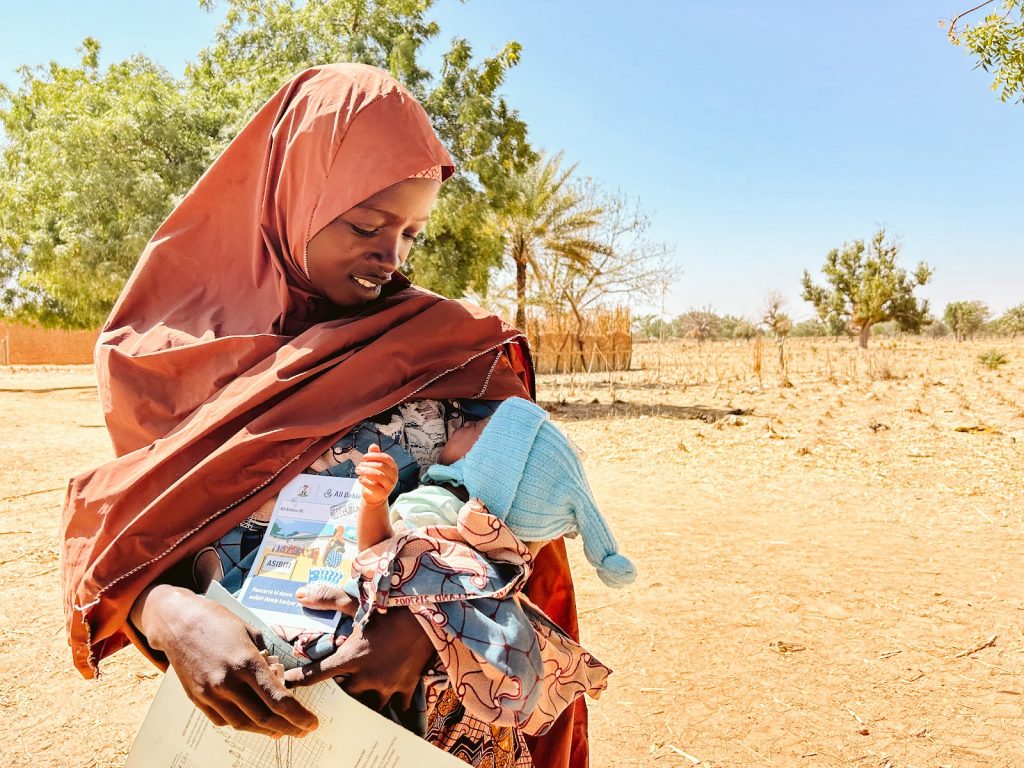
On a recent Saturday morning in January, on a busy road outside Warawa, in northern Nigeria’s Kano State, New Incentives field officer Idris Isa climbs aboard a three-wheel taxi to begin a long day’s work with a mobile vaccination team that is headed to remote villages. The team will be working to reach the babies who missed their last round of routine vaccinations or who have not yet come to the clinic for any shots.
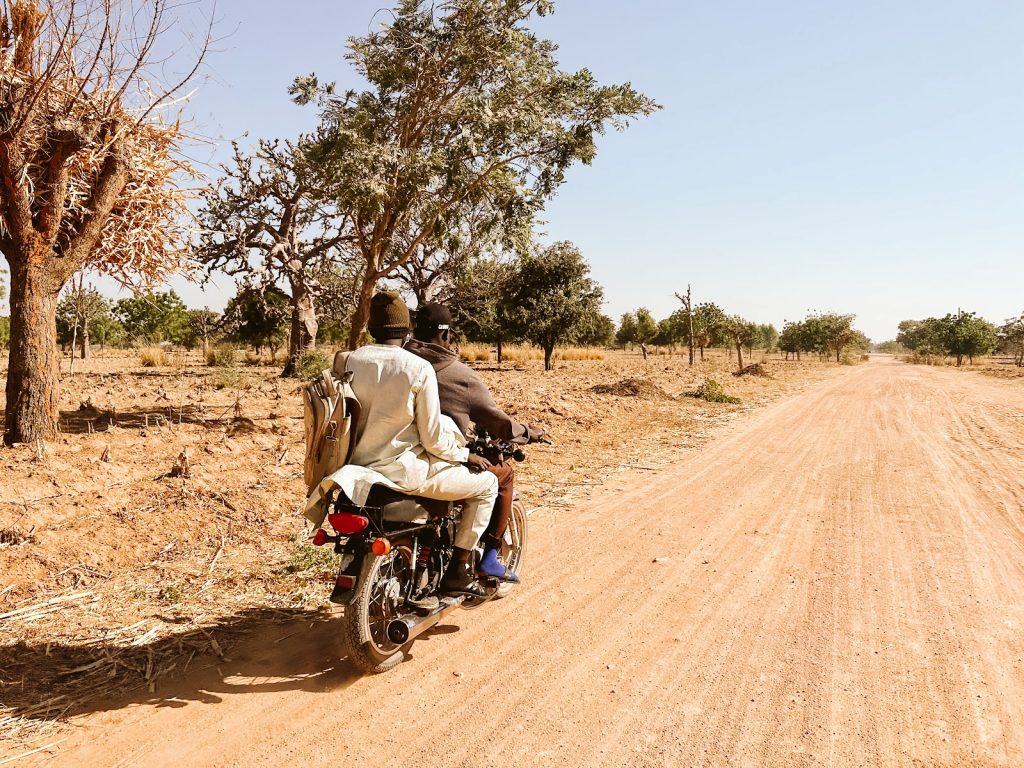
Mobile vaccination teams, also known as outreaches and campaigns, are a critical part of the government’s strategy to increase vaccination rates in an area that has one of the highest child mortality rates and the second highest rate of zero-dose children—those who have not received any vaccines—in the world.
These mobile teams help tackle the last-mile challenge of reaching children of families who do not come to the clinic on their own for any number of reasons, including the cost of travel, lost wages, or misinformation about the safety of vaccines. This was just one of 11,130 mobile vaccination teams that New Incentives staff participated in during January of 2024 across all nine states where we work.
After riding along a dusty dirt road past baobab trees, skeletal bridges, and dormant farms, Idris arrives at Alitini Health Post, where he is greeted by Abubakar Muhammad, the routine immunization service provider of the facility.
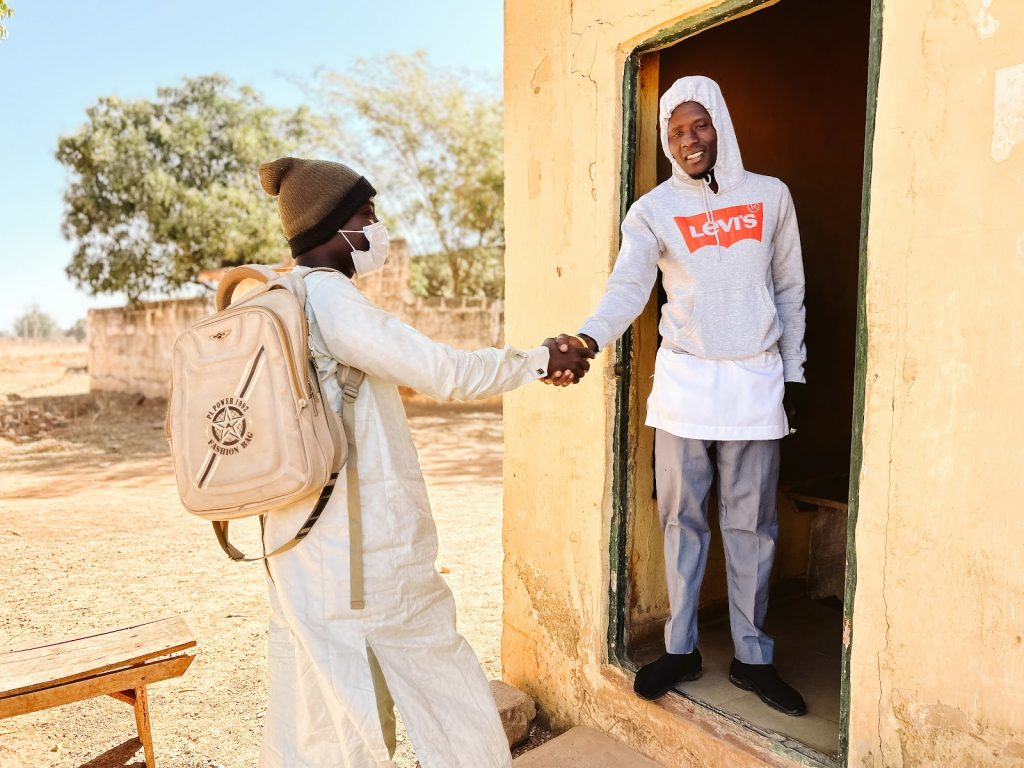
Abubakar and Idris begin to assemble all the necessary items they need for the day. Abubakar gathers the clinic’s Child Immunization Register, a ledger of vaccination records for individual children, and a cooler of vaccines. Before putting each vial in the cooler, Abubakar carefully inspects its expiration date. Each vial also has a tiny indicator called a vaccine vial monitor that changes color when exposed to increasing heat, allowing him to determine whether to use the vaccine or not.
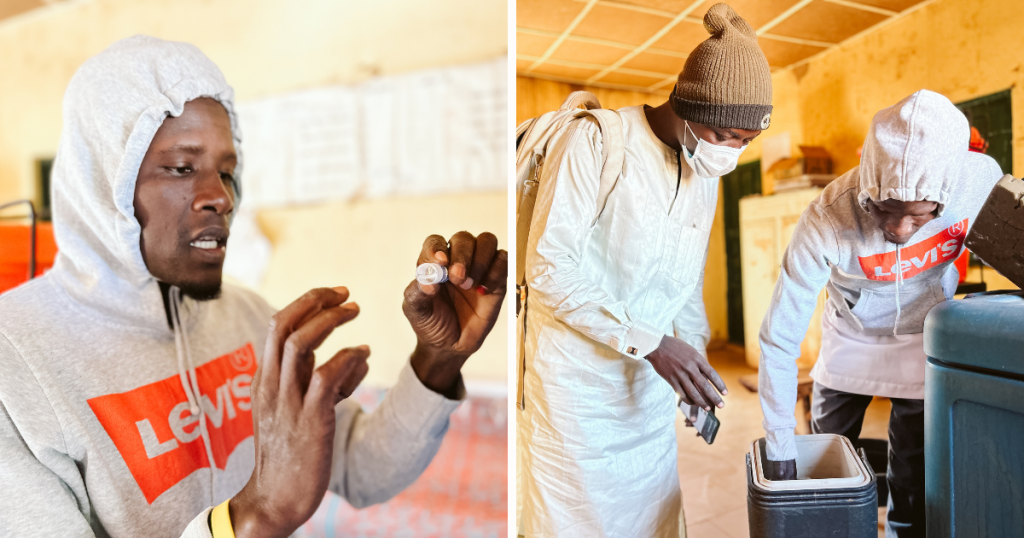
In his backpack, Idris carries essential tools for immunization outreach, including program cards and sticker labels, a smartphone, hand sanitizer, a waste bag, and visual aids used for health talks. Idris is one of 2,000 field officers employed by New Incentives to distribute small cash incentives at government clinics following children’s vaccinations and to raise awareness about the benefits of childhood immunizations. With the mobile team, he is responsible for disbursing cash incentives, coordinating logistics, and engaging community mobilizers for announcements to ensure infants and caregivers will be present when he and Abubakar arrive.
At the clinic, Idris and Abubakar are joined by 50-year-old Mallam Musa Salihu. (”Mallam” means teacher and is a title of respect in northern Nigeria.) Mallam Musa has worked as a cleaner at the clinic for 15 years and is skilled at mobilizing community members with information and encouragement. A few days before, Mallam Musa informed village heads that they would be coming.
“We don’t visit settlements without notice,” emphasizes Idris.
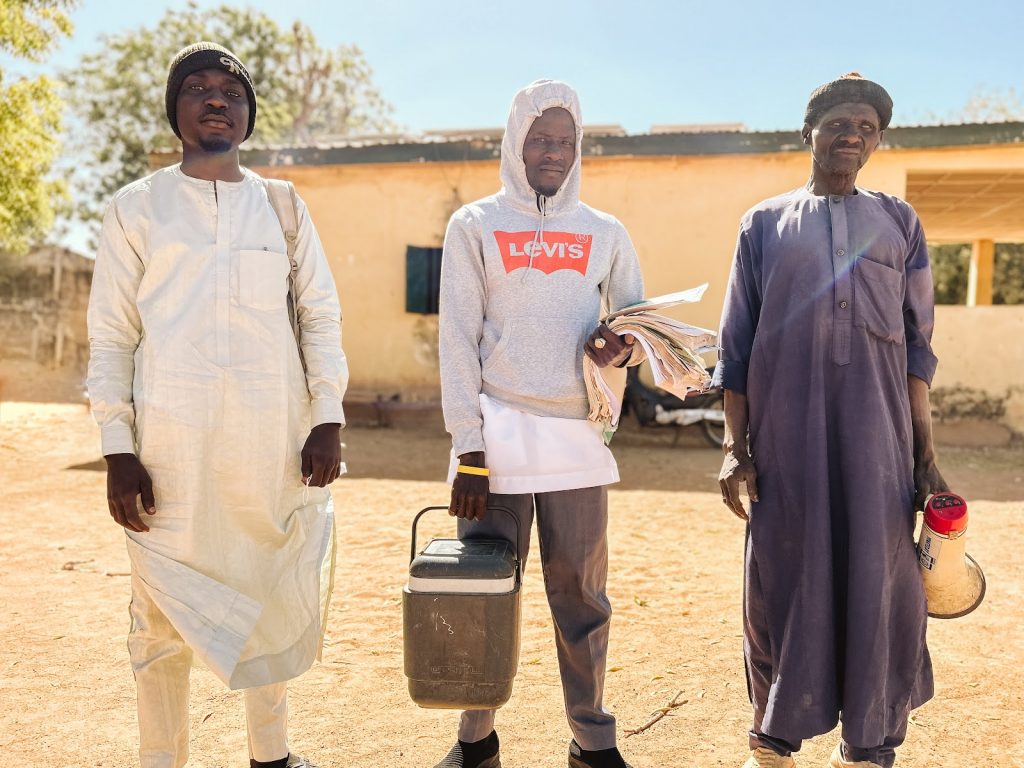
The team travels just four kilometers from the clinic to their initial stop, Jijiyawa. Although the village head is not there that day, he has prior knowledge of their visit. They use the area in front of his house to set up the immunization clinic.
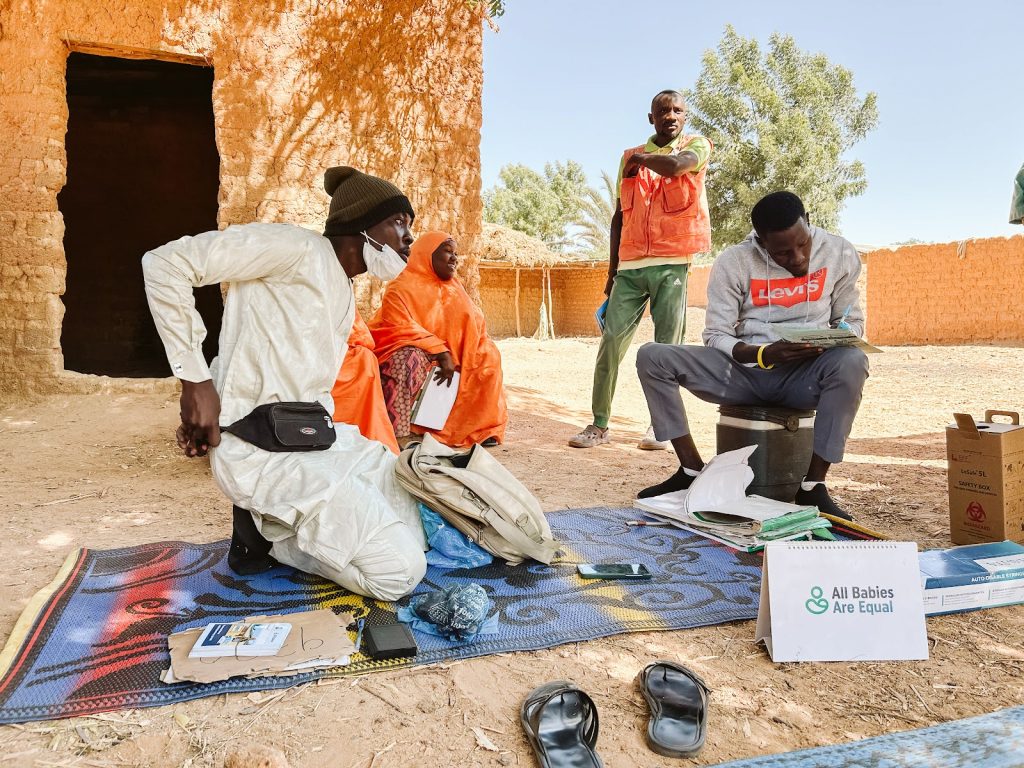
The team is joined by agents from the Community Health Influencers and Promoter Service (CHIPS), who assist in going house-to-house to mobilize caregivers. As the team begins their preparations, Mallam Musa goes around the village to notify residents of their arrival. With a megaphone in hand, he finds the nooks and crannies of the village and talks about the importance of immunization in the local language, Hausa. “Ku garzayo ku kawo ‘ya’yan mu rigakafi,” he says, urging caregivers not to miss the clinic. Additionally, he calls on husbands, who may be hesitant about childhood vaccinations, to get their infants immunized.
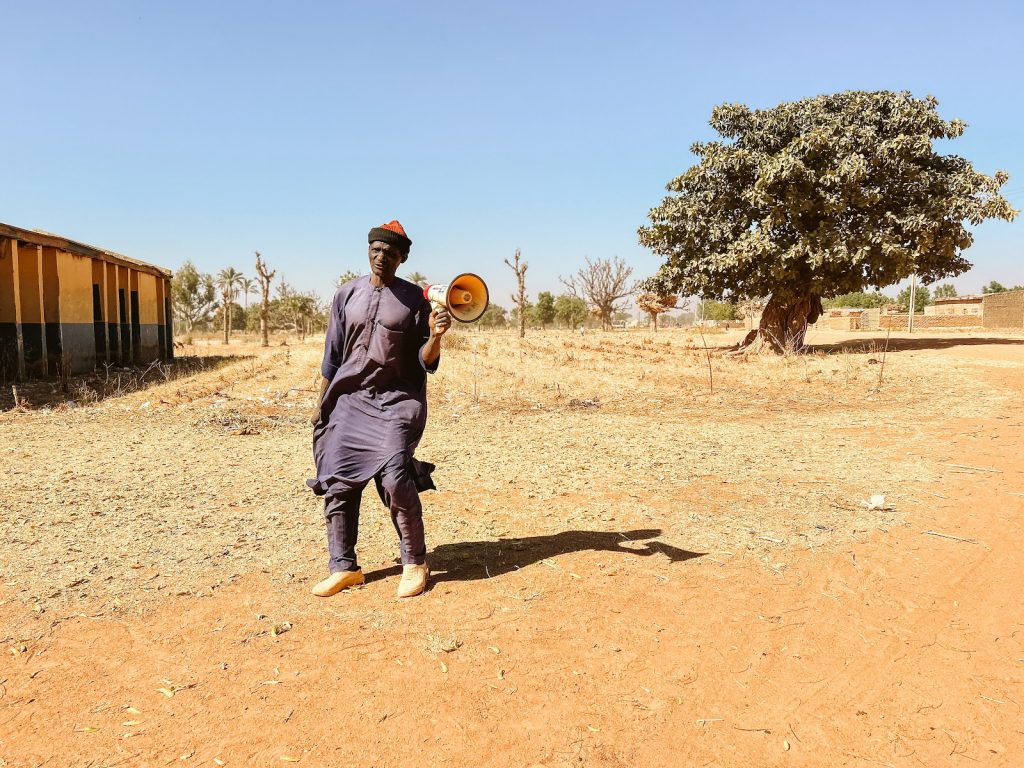
Alawiyya Amadu, a 20-year-old resident of Jijiyawa and a mother of two, is the first caregiver to arrive. Wearing a brown hijab, she holds her tiny three-week-old child, Aliyu, in her hands. Aliyu was delivered at home under the care of a traditional birth attendant. Alawiyya says that the ordeal of childbirth and subsequent illness has worn her down. “I lost a lot of blood, and even simple tasks feel overwhelming,” she confides, barely audible. She says she wasn’t able to trek the four kilometers to the clinic in Alitini and have Aliyu vaccinated.
Ideally, within the first day of birth, newborns should receive three vaccines according to Nigeria’s routine immunization schedule: OPV, BCG, and HBV. These vaccinations are crucial for protecting children against polio, tuberculosis, and hepatitis B.
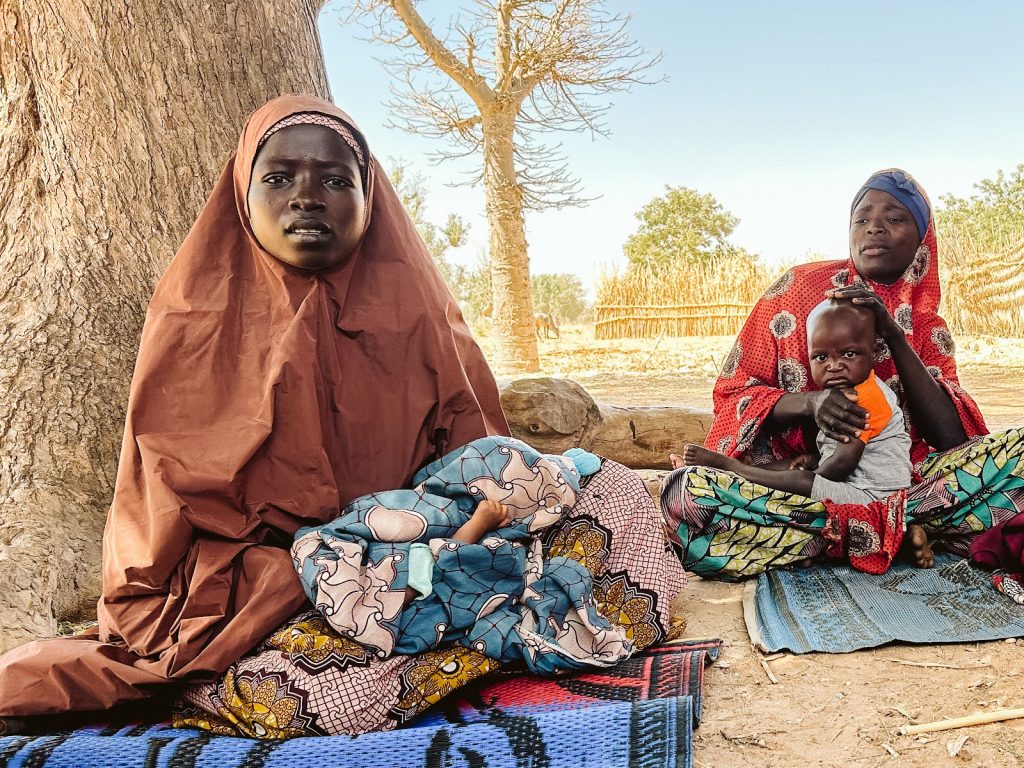
As more caregivers continue to show up, the routine immunization service provider gives the caregivers a health talk, highlighting vaccines’ life-saving benefits and expected mild side effects, while also addressing long-standing misconceptions. Idris then explains New Incentives’ program, including how the incentives and consent processes work.
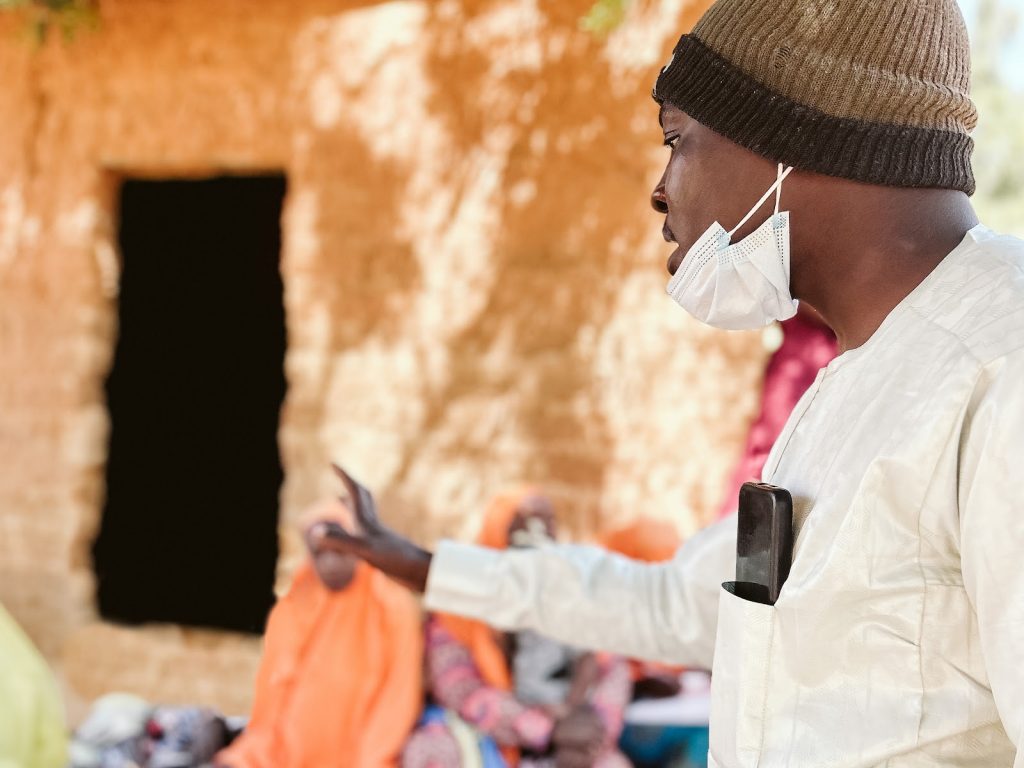
“We give them the chance to also ask questions they may have on vaccination and we give them feedback,” says Idris. “One of the things I love doing as a field officer is voicing out the importance of immunization to caregivers. And it gives me joy when caregivers confide in me the impact they see in their immunized children compared to their other children who were not immunized.”
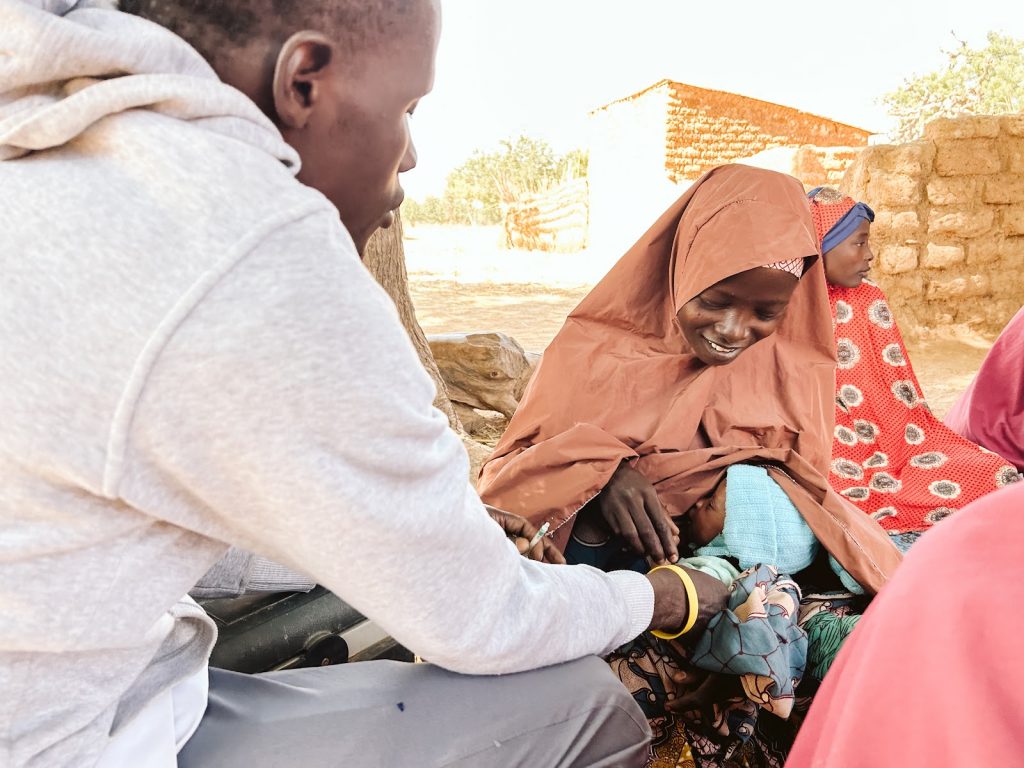
While Abubakar administers the vaccine, the field officer sits beside him to verify that the vaccines are given. Idris then provides each caregiver with a small cash incentive of 1,000 naira (about USD $1), taking a photo for verification purposes. These cash disbursement photos are uploaded to a secure app. With any program that gives out cash, close monitoring is crucial. By utilizing photos, New Incentives helps ensure that the cash incentives get to the intended beneficiary.
Maimuna, who has brought her son Hanif for his fourth round of immunizations, admits, “I forgot about when next I should go to Alitini Health Post; that’s why I defaulted.”
By the end of the session, nine infants, including one zero-dose infant, have received vaccinations—more than the team expected.
Next, the team travels to Yan Gizo, a village that is five kilometers from the health post.
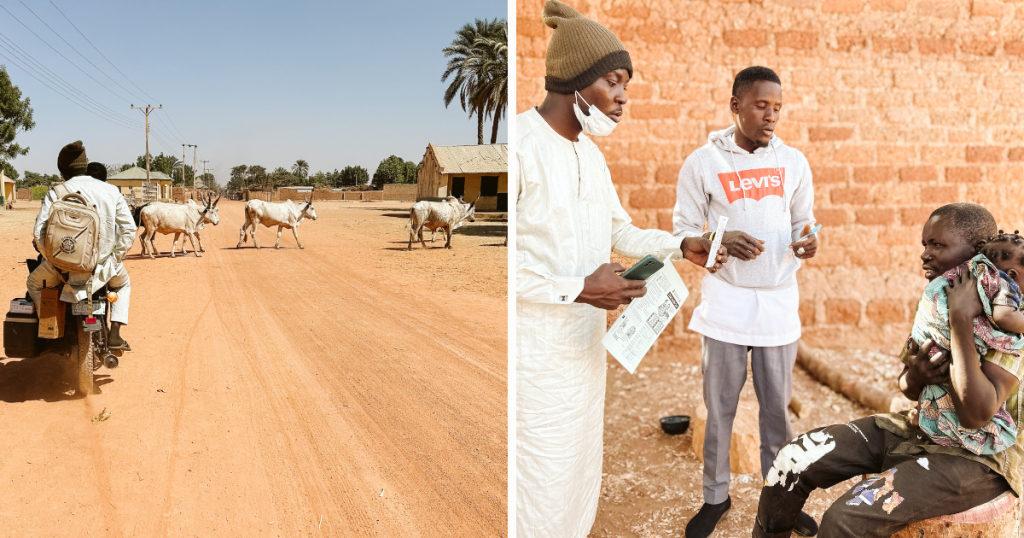
The team is only able to vaccinate one infant out of the expected five infants in Yan Gizo. One of the caregivers is recently divorced, and as a result, has relocated to a different community with their child. Unfortunately, another infant, who was three months old, passed away just one week ago. For the remaining two infants, their fathers refuse to have their children vaccinated even after a conversation with the team. For these families, the team will discuss the situation with the village head. Idris hopes they will willingly come during the next immunization session at the clinic. Otherwise, a mobile vaccination team will come back to the village soon to try to reach them again
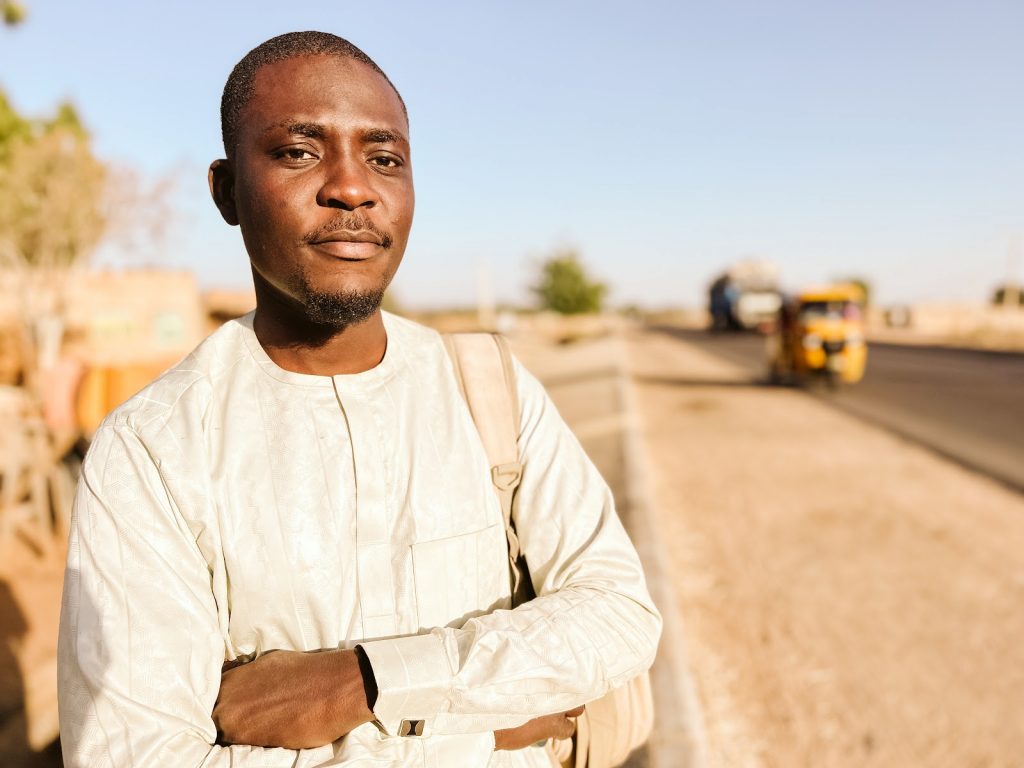

Comments
Love this! I understand why you’re cautious about sharing pictures and developing a bias towards “photogenic” causes, but I think no matter what the image is, it’s nice to see the actual humans that our donations impact 🙂
Comments are closed.